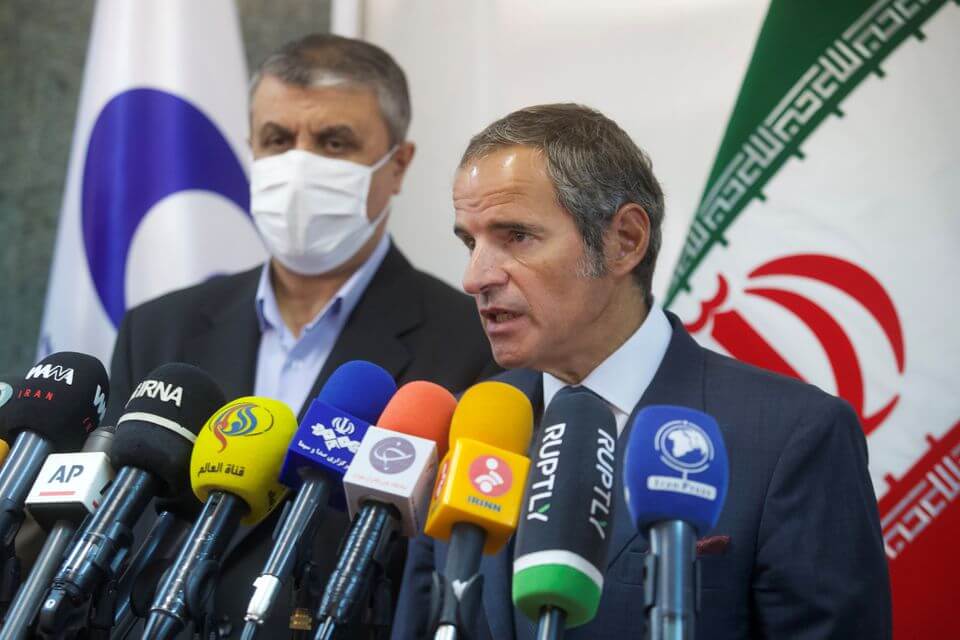Iran has agreed to allow the International Atomic Energy Agency (IAEA) to service its monitoring cameras installed in key Iranian nuclear sites. The move comes as the IAEA accused Iran of jeopardising the Agency’s monitoring work and “stonewalling” investigations into its past activities.
The announcement was made by Mohammad Eslami, the head of the Atomic Energy Organization of Iran (AEOI), during a meeting with IAEA Director-General Rafael Grossi in Tehran on Saturday. As per the new deal, IAEA inspectors will install new memory cards into its surveillance cameras and continue monitoring key Iranian nuclear facilities.
“I am glad to say that today we were able to have a very constructive result, which has to do with the continuity of the operation of the agency’s equipment here,” Grossi said, adding that the agreement would be put to practice “within a few days.”
Also Read: Iran Accelerating Uranium Enrichment to Weapons Grade Levels: IAEA
While Grossi said both sides “managed to rectify the most urgent issue” of continuing IAEA’s monitoring activities, he noted that it “is not a permanent agreement.” “This has always been seen, for me at least, as a stopgap, as a measure to allow time for diplomacy,” he added.
“What matters to us [Iran], and the agency also emphasises upon, is to build trust,” AEOI chief Eslami said. He affirmed that all the issues discussed were “technical, as political issues have nothing to do with AEOI-IAEA cooperation.” Eslami insisted that the “mutual confidence between Iran and the IAEA should remain intact and the agency should have a significant role in carrying out its legal tasks in advancing Iran’s nuclear energy.”
The AEOI chief added that Iran planned to attend the next IAEA Board of Governors (BoG) meeting and “continue current negotiations on the sidelines.” “Grossi has two other trips to Tehran to remove memory cards of the cameras installed in Iran’s nuclear facilities and seal them to be maintained in Iran and insert new memory cards,” he said.
Last week, the IAEA accused Iran of increasing its stockpile of highly enriched uranium to make nuclear weapons. The Agency also noted that Iran has “seriously undermined” the IAEA’s monitoring activities by refusing officials access to monitoring equipment.
Following the IAEA report, Western powers threatened to seek a resolution criticising Iran for preventing the Agency from monitoring its nuclear activities during the BoG meeting later this week. Such a move risked escalating tensions between Iran and the West and seriously undermining negotiations to revive the 2015 nuclear deal.
Furthermore, last week, United States (US) Secretary of State Antony Blinken warned that time was running out for Iran to return to the nuclear deal. “I’m not going to put a date on it but we are getting closer to the point at which a strict return to compliance with the JCPOA does not reproduce the benefits that that agreement achieved,” Blinken said.
Moreover, on Friday, Israeli Prime Minister Naftali Bennett said the IAEA’s report “proves that Iran is continuing to lie to the world and advance a program to develop nuclear weapons while denying its international commitments.” Calling for “an appropriate and rapid international reaction to the severe actions of Iran,” Bennett said, “The IAEA report warns that the time to act is now; therefore, the naïve expectation that Iran will be prepared to change its path via negotiations has been proven to be baseless.”
PM Bennett at the Cabinet meeting: "Last week two reports from the International Atomic Energy Agency @IAEAorg were published.
— PM of Israel (@IsraeliPM) September 12, 2021
These reports have given an official stamp to what we have been saying for a long time: The Iranians are advancing unhindered with their nuclear program pic.twitter.com/gvmGQ9MYJe
“It must be made certain that Iran will never have a nuclear weapons capability,” Bennett noted and warned that “Israel will do everything to prevent Iran from attaining nuclear weapons.” Israel opposes any attempts to revive the 2015 nuclear deal and views Iran’s nuclear programme as an “existential threat” because Iranian authorities, including Supreme Leader Ayatollah Ali Khamenei, have called for the “annihilation” of the Jewish State.
In 2015, Iran and the P5+1 (the United States, the United Kingdom, France, Russia, China, and Germany) signed the landmark Joint Comprehensive Plan of Action (JCPOA). The deal, which extended sanctions relief to Iran to significantly reduce its nuclear programme, seeks to prolong its “breakout capacity,” which is the time required to produce highly enriched uranium for one nuclear weapon.
However, the previous US administration led by President Donald Trump decided to withdraw from the JCPOA in 2018 and re-imposed punitive measures on Iran. After coming to power in 2021, President Joe Biden expressed a willingness to re-join the JCPOA and remove the crippling sanctions. Consequently, world powers and Iran have held intense negotiations in Vienna, Austria, since April to restore the deal. While diplomats have expressed satisfaction with the nuclear discussions so far, the sixth round of talks ended on June 20 with no sign of when the next round of negotiations would resume.
In June, Iran elected hardline cleric Raisi as president, raising concerns that his government could pursue an aggressive foreign policy in the Middle East, including expanding its proxy network in the region and taking an uncompromising stand on its nuclear programme.

